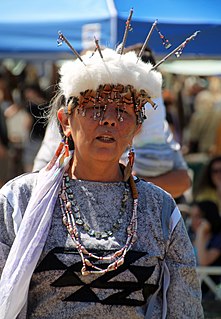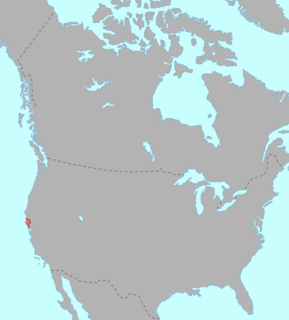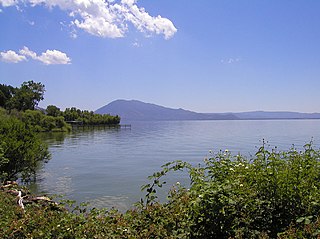
The Pomo are an indigenous people of California. The historical Pomo territory in Northern California was large, bordered by the Pacific Coast to the west, extending inland to Clear Lake, and mainly between Cleone and Duncans Point. One small group, the Northeastern Pomo of the Stonyford vicinity of Colusa County, was separated from the core Pomo area by lands inhabited by Yuki and Wintuan speakers.

The Pomoan, or Pomo, languages are a small family of seven languages indigenous to northern California spoken by the Pomo people, whose ancestors lived in the valley of the Russian River and the Clear Lake basin. Four languages are extinct, and all surviving languages except Kashaya have fewer than ten speakers.

The Kashia Band of Pomo Indians of the Stewarts Point Rancheria is a federally recognized tribe of Pomo people in Sonoma County, California. They are also known as the Kashaya Pomo.

Eastern Pomo, also known as Clear Lake Pomo, is a nearly extinct Pomoan language spoken around Clear Lake in Lake County, California by one of the Pomo peoples.
Kashaya has several meanings, see:

Northern Pomo is a critically endangered Pomoan language indigenous to the state of California. The Pomo were a group of people who spoke what was documented as the Pomoan languages, and the speakers of Northern Pomo were those who lived specifically in the northern and largest area of the Pomoan territory. Other communities near to the Pomo were the Coast Yuki, the Huchnom, and the Athabascan.

The Lake Miwok are a branch of the Miwok, a Native American people of Northern California. The Lake Miwok lived in the Clear Lake basin of what is now called Lake County.
The indigenous religion of the Pomo people, Native Americans from Northwestern California, centered on belief in the powerful entities of the 'Kunula', a Coyote, and 'Guksu', a spirit healer from the south.

The mythology of the Miwok Native Americans are myths of their world order, their creation stories and 'how things came to be' created. Miwok myths suggest their spiritual and philosophical world view. In several different creation stories collected from Miwok people, Coyote was seen as their ancestor and creator god, sometimes with the help of other animals, forming the earth and making people out of humble materials like feathers or twigs.

Kuksu, also called the Kuksu Cult, was a religion in Northern California practiced by members within several Indigenous peoples of California before and during contact with the arriving European settlers. The religious belief system was held by several tribes in Central California and Northern California, from the Sacramento Valley west to the Pacific Ocean.

Southern Pomo is one of seven mutually unintelligible Pomoan languages which were formerly spoken by the Pomo people in Northern California along the Russian River and Clear Lake. The Pomo languages have been grouped together with other so-called Hokan languages. Southern Pomo is unique among the Pomo languages in preserving, perhaps, the greatest number of syllables inherited from Proto-Pomo.
The Bloody Island Massacre occurred on an island in Clear Lake, California, on May 15, 1850.

The Manchester Band of Pomo Indians of the Manchester Rancheria, formerly named the 'Manchester Band of Pomo Indians of the Manchester-Point Arena Rancheria, is a federally recognized tribe of Pomo Indians in California. The tribe is a community of Pomo Native Americans who are native to Northern California. The aboriginal Bokeya society transformed into the contemporary Manchester Band of Pomo with the approval of their Constitution and By-Laws in 1936.
The Sherwood Valley Rancheria of Pomo Indians of California is a federally recognized tribe of Pomo Indians in California.
The Habematolel Pomo of Upper Lake is a federally recognized tribe of Pomo Indians in Lake County, California. The tribe's reservation, the Upper Lake Rancheria, is 119 acres (0.48 km2) large and located near the town of Upper Lake in northwestern California.

Central Pomo is an extinct Pomoan language spoken in Northern California. Pre-contact speakers of all the Pomoan languages have been estimated at 8,000 all together. This estimation was from the American anthropologist Alfred Kroeber.

Northeastern Pomo, also known as Salt Pomo, is a Pomoan language of Northern California. There are no living fluent speakers. It was spoken along Stony Creek, a tributary of the Sacramento River. Northeastern was one of seven mutually unintelligible Pomoan languages spoken in Northern California. Unlike the other six Pomoan languages(going to north to south: Northern Pomo, Central Pomo, Eastern Pomo, Southeastern Pomo, Kashaya Pomo, Southern Pomo), Northeastern Pomo was not spoken in an area immediately contiguous with any other Pomoan-speaking area. Northeastern Pomo speakers were ringed by speakers of Yuki, Nomlaki, and Patwin; Yuki is unrelated to Pomoan or Nomlaki and Patwin, both of which are within the Wintu language family.

Southeastern Pomo, also known by the dialect names Elem Pomo, Koi Nation Lower Lake Pomo and Sulfur Bank Pomo, is one of seven distinct languages comprising the Pomoan language family of Northern California. In the language's prime, Southeastern Pomo was spoken primarily in an area surrounding East Lake and Lower Lake, in Lake County, along the eastern coast of Clear Lake, in Northern California by the Pomo people. Southeastern Pomos inhabited an area on the northern bank of Cache Creek, and the Sulfur Bank Rancheria. Dialectal differences between the two sites of habitation seem to be minimal, and may be limited to a small number of lexical differences.

Frog Woman Rock is a distinctive volcanic monolith located in Mendocino County, California, in the Russian River canyon through the California Coast Ranges. The California Historical Landmark, adjacent to U.S. Route 101, is a popular recreational site for rock-climbing and whitewater kayaking.








